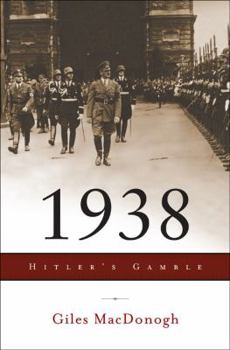1938: Hitler's Gamble
Select Format
Select Condition 
Book Overview
In this masterful narrative, acclaimed historian Giles MacDonogh chronicles Adolf Hitler's consolidation of power over the course of one year. Until 1938, Hitler could be dismissed as a ruthless but... This description may be from another edition of this product.
Format:Hardcover
Language:English
ISBN:0465009549
ISBN13:9780465009541
Release Date:December 2009
Publisher:Basic Books (AZ)
Length:324 Pages
Weight:1.30 lbs.
Dimensions:1.1" x 6.6" x 9.5"














